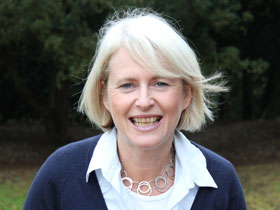01 July 2011
Make room for the singles
For over half a century, a major demographic shift is taking place in the Western world reflected in an increasing number of single people. This is mainly caused by a trend towards delaying marriage, an increase in marriage breakdown and cohabiting couples, and the ageing society, Marijke Hoek writes ...
One in three Christians is single. There are more than twice as many single women as men in the evangelical church. Yet, the Church has been relatively silent on the subject. Teaching, training and ethical discussions focus mainly on family and (re-) marriage. In the absence of a vision for the single lifestyle, we have developed a community ethic in which marriage is portrayed as 'the norm' and the only context for human fulfilment. The calamity of such emphasis is that we don't address life in biblical terms and poorly equip ourselves for life and for mission.
The New Testament has a far richer balance. Both Jesus and Paul lived single lives and affirm marriage and singleness as viable lifestyles within God's purposes. Marriage was a self-evident institution in first century Greek society and in Hebrew society little place was given to singleness with exception of the prophetic community. Having affirmed marriage, Jesus' radical teaching on singleness in Matthew 19 aims to enlarge the view. It is sandwiched between a double call to "accept", a word that means 'to make room for', 'to understand with a view to a changed life' ('choreo').
Paul also affirms marriage and singleness. His vision is for a community undivided in its devotion to the Lord and unhindered by social settings in its mission (1 Corinthians 7). Throughout the chapter, the theme of 'calling' is central. Our social setting is given by God to live out our call. Our status may change - single, married, divorced, bereaved, engaged. But whatever our social status, it is meant to be the context for our flourishing.
Paul and Jesus pose a positive challenge. The primary focus on the kingdom, and secondary nature of all else, places singleness prominently in the light of 'a freedom to' rather than 'an absence of'. They themselves are obvious role models, fulfilling the purposes of the kingdom of heaven and enjoying a close relationship with God and people. Similarly, the older widows who serve and pray are commended (1Timothy 5).
Two are better than one
Two are better than one. This text in Ecclesiastes 4 reflects on the strength of relationships. No longer is "a man without a brother". To 'belong' is a biblical answer to a basic human need (Genesis 2:18). Our inherent incompleteness causes us to seek community in the form of marriage, family, tribe, friendship, fellowship and society. The Bible reflects on a wide range of relationships that enrich us and provide a vanguard for life. In his book Urban Tribes, Ethan Watters describes the growing culture of young urban singles who weave relational webs as a kind of extended family, networks with a strong social cohesion. Friendship is a rich gift indeed (John 15). And the Church is potentially even richer as we cross generations.
Jesus and Paul widen the 'family' concept, a new context of belonging, inclusion and mutual support (John 19, Romans 8). They express God's heart. After all, He places the lonely in families (Psalm 68:6). Jesus and Paul understand singleness within the vocation of costly discipleship, and so, they also reflect on an element of struggle. Discipleship places clear moral requirements on us all, whether married or single. For some, married life is advised to establish a framework for holy living. Others have chosen the single lifestyle, many are single because that's what life has brought (so far). For some, marriage is not a viable option, others are bereaved or divorced. Not all will be made well on this side of life. Paul's endorsement of the single life is partly based on the view that "the time is short". The grief and unfulfilled desire are part of our groaning as we wait for the fullness of life. Marriage, singleness, grief, happiness, possessions - the whole of life is placed in the wider context of eternity.
Where the biblical witness shows a balanced view on singleness and marriage, the Church throughout much of its history reflects little balance. Yet, we can delve into a treasure of exemplary singles. Francis of Assisi, Thomas Aquinas, Dietrich Bonhoeffer, Corrie ten Boom, Mother Theresa, John Stott, scores of nuns, monks and missionaries. Have we been curious enough to learn from their wisdom on singleness I wonder? Jesus' double punch line calling us to make room for the single lifestyle challenges us to recover a vision for singleness as a valid and authentic lifestyle. Such vision will contribute to a healthier in-house climate and will lay the foundation for maturity in our teaching, pastoral care, community life and mission.
Both marriage and singleness play a role in becoming the community God intended. Making room for the singles is vital. As the Corinthian church was repeatedly called to be re-socialised by the gospel, so also are we called to be shaped by a biblical perspective that will enhance the personal and communal wellbeing as we more faithfully reflect the shalom of God's kingdom. The question 'How then do we live?' will be shaped by us all, married and single, as we aim to glorify Him. So make room for the dialogue to continue.

Marijke Hoek is the Alliance's Forum for Change Co-ordinator
You might also be interested in
- 08 Aug 2018 ChristChurch Fulham: stepping into the supernatural
- 27 Jun 2018 idea: Welcomed into divine community
- 24 Apr 2018 idea: Christ is King, not me
- 24 Apr 2018 idea: Establishing God’s kingdom in the next generation
- 27 Feb 2018 idea: From suicidal despair to a life filled with love

